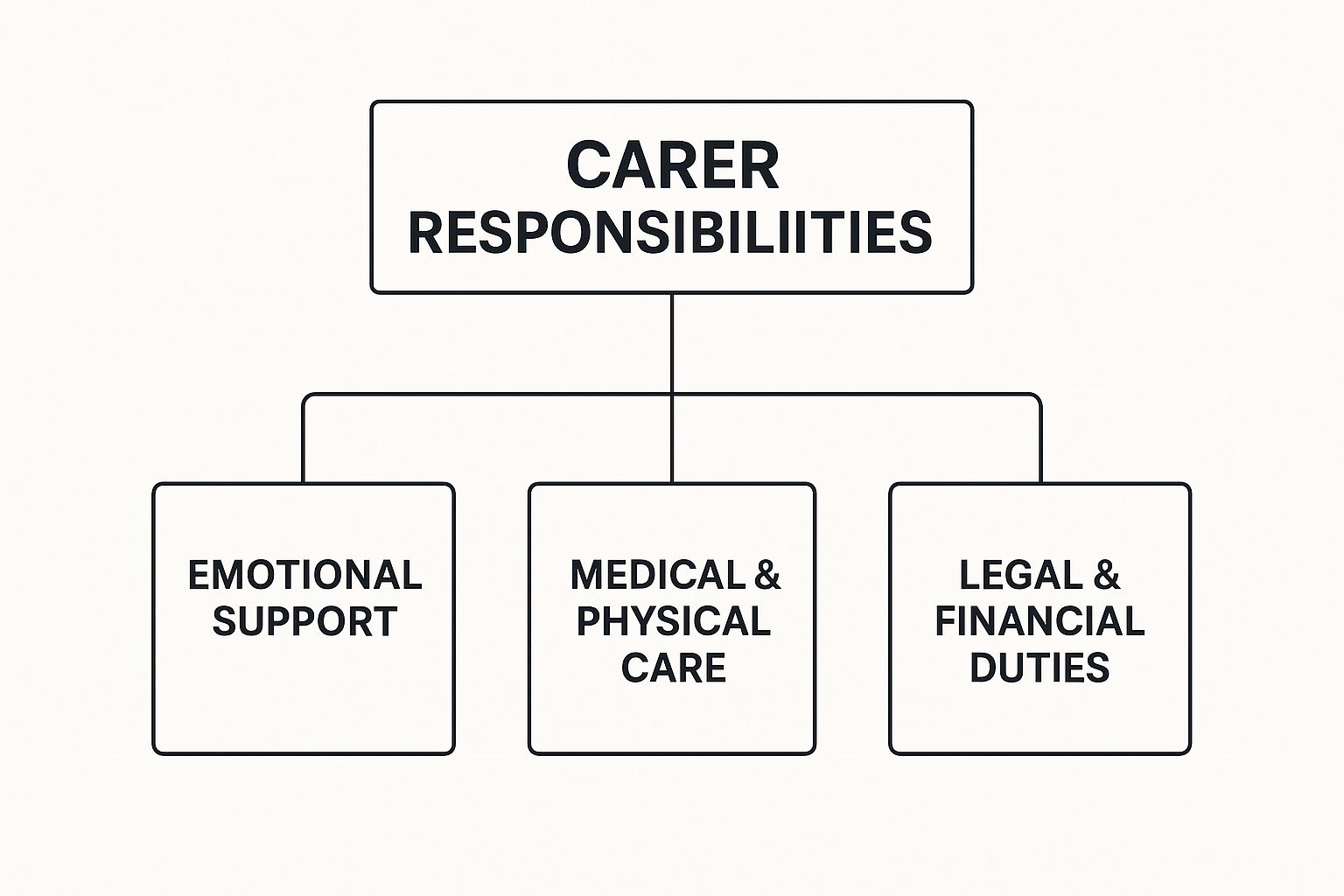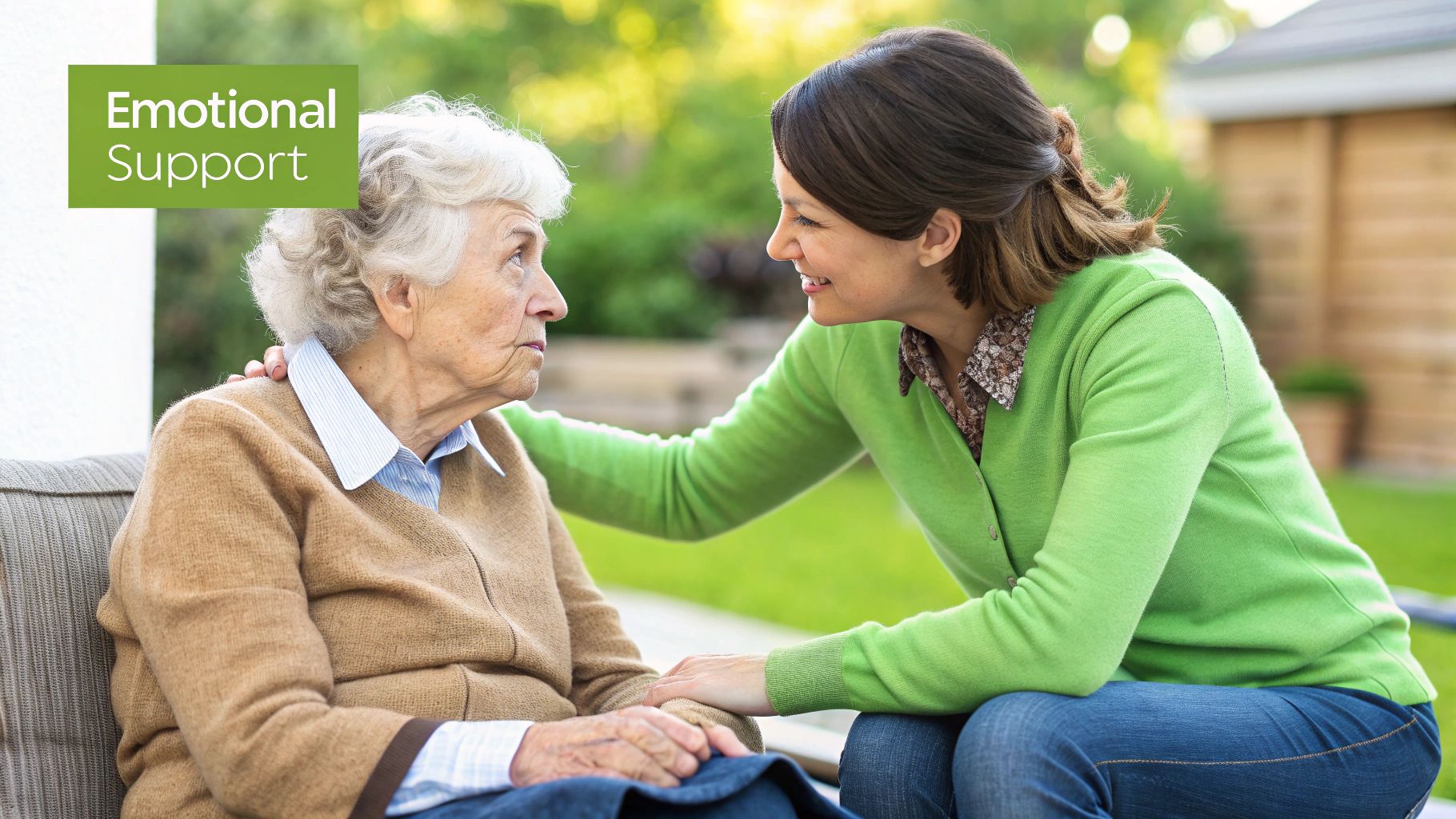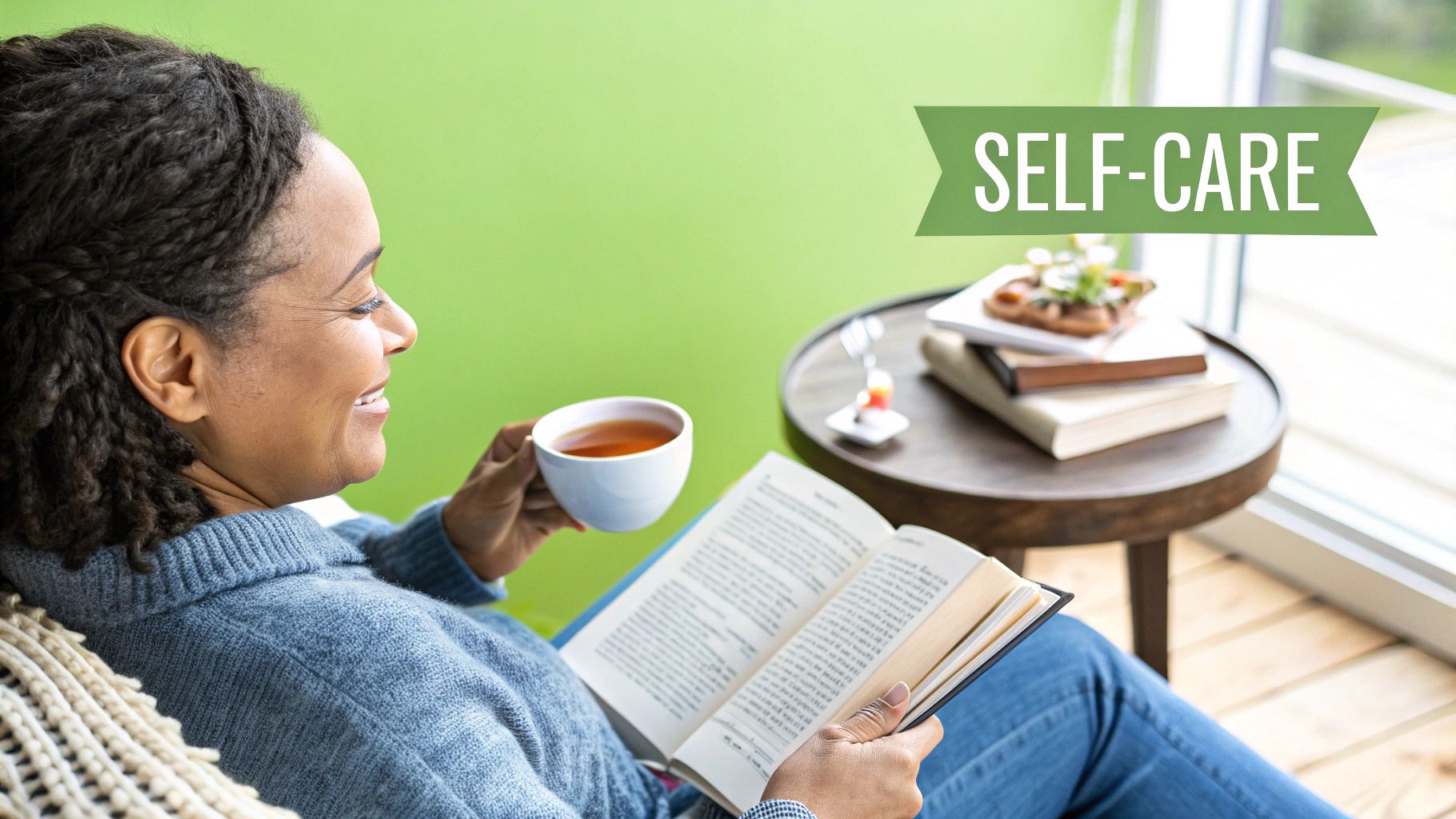When you take on the role of a carer, you’re doing so much more than just helping out. In many ways, you become a project manager for someone's wellbeing. It’s a role that asks you to blend practical help, emotional support, and even administrative work to help the person you care for live as comfortably and independently as they possibly can. This is a role that truly requires empathy, organisation, and a whole lot of heart.
Unpacking the Core Responsibilities of a Carer
Becoming a carer is a huge commitment, whether you’re looking after a family member or doing it professionally. In the UK, it’s a role that nearly one in ten people take on as unpaid carers, which just goes to show how many of us step up to support the people we love. It's a dynamic and often demanding job that mixes day-to-day practical help with a deep emotional connection.
Thinking of your duties as being a "project manager for a person's wellbeing" is a great way to grasp the full scope of what’s involved. It’s not about ticking off one or two tasks; it’s about looking at the big picture of someone's life and making sure their health, safety, and happiness are all looked after. This could mean anything from organising doctor's appointments to simply being a friendly face and a listening ear when they need it most.
The Three Pillars of Caregiving
The list of responsibilities can feel a bit overwhelming at first, but it helps to break them down into three main areas. Understanding these pillars can make it easier to organise your tasks and see the different skills you'll need.
- Practical and Physical Support: This is the most visible side of caregiving. It’s all the hands-on help with daily activities, making sure the person’s physical needs are met with dignity and respect.
- Emotional and Social Support: This pillar is all about looking after a person's mental and emotional health. It’s about offering companionship, fighting their corner when needed, and keeping them connected to friends and community to fend off loneliness.
- Administrative and Financial Duties: This involves the paperwork, appointments, and money matters. It requires a good bit of organisation and often means you're the main point of contact between the person you care for and various services or agencies.
This diagram gives a great visual breakdown of these core areas.

As you can see, a carer's duties aren't just one thing. They branch out into different, but deeply connected, areas of support.
A carer’s role is not just about what you do, but also about how you make the person feel. It’s a blend of action and empathy, where tasks like helping someone dress are just as important as the reassurance you provide while doing it.
This mix of responsibilities means you have to be adaptable. One day might be filled with practical things like household chores and managing medication. The next could be spent at a hospital appointment, followed by offering comfort after a tough consultation. Every single task adds up to create a complete support system, all designed to protect and enhance that person's quality of life.
At-a-Glance Overview of Carer Responsibilities
To make sense of these varied duties, it's helpful to see them laid out clearly. This table summarises the primary domains of a carer's responsibilities, offering a quick reference for the key areas we've just discussed. It gives you a snapshot of what the role truly entails day-to-day.
| Responsibility Domain | Examples of Key Tasks |
|---|---|
| Practical & Physical Support | Assisting with washing, dressing, and grooming. Preparing meals and ensuring proper nutrition. Helping with mobility and transfers. Administering medication or prompting. |
| Emotional & Social Support | Providing companionship and conversation. Arranging social outings or visits with friends. Encouraging hobbies and interests. Acting as an advocate in healthcare settings. |
| Administrative & Financial Duties | Scheduling and managing appointments. Handling correspondence and paying bills. Liaising with social services or healthcare professionals. Assisting with benefits applications. |
Ultimately, these domains all work together. A well-managed appointment schedule (administrative) can lead to better health outcomes (physical), which in turn boosts emotional wellbeing. It’s this holistic approach that defines truly great care.
Managing Practical Day-to-Day Duties

The practical, hands-on tasks are really the bedrock of what a carer does day in and day out. They’re the most visible part of the job, and they directly influence the health, comfort, and safety of the person you’re supporting. Getting these duties right takes a good dose of organisation, patience, and a genuine respect for the individual's dignity.
It helps to think of yourself as the director of a smoothly run home, making sure every part of the day flows without a hitch. This can mean anything from helping with personal care and managing the household to being the main point of contact for a whole team of healthcare professionals. It’s all about building a safe, predictable, and supportive space where someone can not just live, but truly thrive.
Assisting with Personal Care and Mobility
One of the most essential parts of the role is helping with personal care. This can involve support with washing, dressing, and general hygiene. The real key here is to handle these sensitive tasks with compassion, always protecting the person's privacy and encouraging them to do as much as they can for themselves.
Helping someone stay mobile is just as vital. You might be assisting them to get from bed to a chair, offering a steady arm as they walk, or using specialist equipment like walkers or hoists. The aim is always to make movement safe and comfortable, which in turn reduces the risk of falls and helps them stay as active as possible.
Maintaining dignity during personal care isn't just a kindness; it's a core duty. It transforms a routine task into an act of respect, reinforcing the person's sense of self-worth and control over their own life.
Household Organisation and Safety
A carer often steps into the shoes of a household manager, making sure the living space is more than just tidy—it needs to be safe and adapted to the person's needs. This involves a whole range of jobs that keep the home ticking over.
A safe, organised home is a cornerstone of good care. Many people find that learning how personalised home care supports independent living provides brilliant insights into creating an environment that works. The goal is always to empower the individual to be as autonomous as possible within a secure setting.
Being ready for the unexpected is also a crucial part of the job. This means having a plan in place, like a comprehensive emergency preparedness checklist, to keep everyone safe during things like power cuts, severe weather, or other unforeseen events.
Healthcare Coordination and Medication Management
Beyond the immediate jobs at home, a massive part of a carer's duties involves coordinating healthcare. You often become the central hub, linking the person you care for with their GP, specialists, and other medical professionals.
This side of the role involves several key responsibilities:
- Managing Medications: Making sure the correct dose is taken at the right time is non-negotiable. This also includes reordering prescriptions and keeping an eye out for any side effects.
- Scheduling Appointments: You'll be the one booking, tracking, and often attending appointments with GPs, hospital consultants, dentists, and opticians.
- Effective Communication: You act as a vital link between the individual and their healthcare team. This means clearly passing on information, asking the right questions, and advocating for their needs and wishes during consultations.
Handling these healthcare logistics effectively is what ensures continuity of care. It’s a critical job that requires top-notch organisation and crystal-clear communication to achieve the best possible health outcomes.
Providing Emotional and Social Support

While practical tasks are a huge part of the role, some of the most profound responsibilities as a carer are the ones you can’t see. This is the invisible work of providing emotional and social support, helping someone feel valued, connected, and secure. It’s about becoming a confidant, a companion, and a steadfast ally.
This emotional labour is just as draining—and every bit as important—as any physical task. It means actively listening, offering reassurance on tough days, and simply creating a positive atmosphere. Your presence can be a powerful antidote to the loneliness and isolation that so many people face, especially when dealing with health challenges or reduced mobility.
This is a significant pressure, and it's felt keenly by many. Data from Carers UK highlights that 16% of UK carers are part of the "sandwich generation," simultaneously looking after children and their parents or other relatives. This immense pressure contributes to 31% of these carers experiencing anxiety or depression. These figures show just how heavy the emotional load can be.
Nurturing Companionship and Connection
Honestly, one of the greatest gifts a carer can give is meaningful companionship. This goes far beyond simply being in the same room; it's about genuine engagement and creating shared moments that matter.
Your role here is to help combat loneliness by being a friendly face and a trusted listening ear. This could look like:
- Sharing a cup of tea and chatting about the day’s news.
- Looking through old photo albums together, sparking fond memories.
- Playing a board game or watching a favourite film.
- Helping them connect with friends and family, whether through phone calls, video chats, or arranging visits.
The real goal is to foster a relationship built on trust and mutual respect. As we’ve talked about before, why companionship is just as important as physical care comes down to these small, consistent actions. They are the building blocks of a strong, supportive connection.
Being a carer means you often become the keeper of stories, the shoulder to lean on, and the person who remembers the little things that bring a smile. This emotional attunement is a core responsibility that validates their feelings and reinforces their sense of self.
Managing Difficult Emotions
Supporting someone emotionally also means helping them navigate difficult feelings like frustration, sadness, or anxiety. It takes a world of patience and empathy to listen without judgement and offer comfort without trying to "fix" everything.
At the same time, you have to manage your own emotional responses. It's completely natural to feel overwhelmed or upset at times. Recognising these feelings and having strategies to cope is crucial for your own wellbeing and your ability to provide sustainable care. This emotional resilience is a vital, though often unspoken, part of your duties.
Navigating Financial and Legal Duties
Beyond the hands-on, emotional side of caring, you’ll often find yourself stepping into the role of administrator. This is where the financial and legal duties come in, and for many, it can feel like the most intimidating part of the job. But getting a firm grasp on these responsibilities is crucial for protecting the person you care for—and yourself.
Let's be honest, it can feel overwhelming. A great first step is to organise finances into a clear, manageable system. This creates a solid foundation for everything else, from paying bills to long-term planning.
Managing Finances and Claiming Benefits
A key part of your role might involve helping with day-to-day money matters. This could be as simple as assisting with the weekly shop or paying household bills, or it could mean managing bank accounts and pensions. How much you do really depends on what the person is capable of and the level of trust between you.
It's also vital to make sure they're getting all the financial support they're entitled to. In the UK, several benefits are available to help with the extra costs that come with illness or disability.
You’ll want to be aware of a couple of key ones:
- Attendance Allowance: This is for people over State Pension age who have a disability severe enough that they need someone to help look after them. It’s designed to help with those extra costs.
- Personal Independence Payment (PIP): For those aged 16 to State Pension age, PIP helps with added living costs if you have a long-term physical or mental health condition.
The application process for these benefits can seem a bit convoluted, but brilliant organisations like Citizens Advice offer free, expert help to guide you through it.
Understanding Power of Attorney
As a person's needs grow, you might need to formalise your role in making decisions for them. This is where a Lasting Power of Attorney (LPA) becomes incredibly important.
An LPA is a legal document that lets a person (the 'donor') appoint one or more trusted people (the 'attorneys') to make decisions on their behalf. It’s a way of planning for the future, ensuring their wishes are followed if they ever lose the mental capacity to make their own choices.
There are two distinct types of LPA:
- Health and Welfare: This covers decisions about things like medical care, daily routines (like washing and dressing), and even moving into a care home.
- Property and Financial Affairs: This one is all about managing money—from bank accounts and bills to collecting benefits and selling property.
Getting an LPA set up while the person still has the capacity to make that decision is vital. It provides legal clarity and peace of mind for everyone, helping to avoid complicated and often stressful court applications down the line.
Your Rights as a Carer
Don't forget about your own financial health in all of this. If you spend 35 hours a week or more caring for someone, you may be eligible for Carer's Allowance.
Just as importantly, you have to look after yourself. Recognising when you need a break isn't a sign of weakness; it's essential for avoiding burnout. Understanding what respite care for the elderly is can connect you with the support you need to rest and recharge, so you can continue to provide the best care possible.
How to Be an Effective Advocate

One of the most vital responsibilities as a carer is stepping into the role of an advocate. In simple terms, this means being the voice for the person you support. It's about making sure their needs, rights, and wishes are not just heard but genuinely respected, especially when dealing with the healthcare and social care systems.
This role is incredibly important. In the UK, there are around 5.8 million unpaid carers, and a staggering 1.7 million of them provide over 50 hours of care every single week. These aren't just numbers; they represent the immense contribution carers make, often filling the gaps left by formal services. You can learn more about these key statistics on the Carers UK website.
Being an advocate isn’t about being confrontational. It’s about being prepared, organised, and clear so you can work with professionals to get the best outcome for the person you care for.
Preparing for Appointments and Meetings
Effective advocacy starts long before you ever set foot in a GP’s surgery or a meeting with social services. Preparation is your single most powerful tool.
The first step? Create a dedicated folder or notebook. Use it to keep a running record of everything.
- Write down questions beforehand: Appointments can feel rushed and stressful. A pre-written list of questions ensures you cover all the important points.
- Summarise key issues: Jot down the main concerns, symptoms, or any changes you've noticed. Be specific with dates and details—it makes a huge difference.
- Bring all relevant paperwork: This means packing the list of current medications, letters from specialists, and a copy of their care plan.
This simple act of getting organised transforms you from a passive observer into an active, informed partner in the conversation.
Being an effective advocate means turning observations into evidence. A clear, organised record of symptoms, behaviours, and communications provides a solid foundation for discussions with professionals and ensures your concerns are taken seriously.
Knowing Your Rights and Escalating Issues
To be a strong advocate, you need to understand the system you're working within. Start by getting familiar with the person's care plan, which should clearly outline the support they're entitled to. If you feel those standards aren't being met, you have every right to raise your concerns.
Your first port of call should be to try and resolve the issue directly with the service provider—whether that's the care home manager or the GP practice manager. Always keep a note of who you spoke to, when, and what was said.
If the problem isn't sorted, you have the right to make a formal complaint. For NHS services, you can use the provider’s own complaints procedure or go through NHS England. For social care services, your first step is the local council. If you're still not satisfied with the outcome, the Local Government and Social Care Ombudsman can investigate your case independently.
Knowing these pathways gives you the confidence to act decisively when things go wrong, making sure the person you look after receives the quality of care they truly deserve.
The Importance of Caring for Yourself
Of all the duties a carer juggles, looking after your own wellbeing is often the first to be pushed aside. It can feel like a luxury you can’t afford, but in reality, self-care isn't just important—it's an essential part of the job. You can’t pour from an empty cup. If you run yourself into the ground, you simply won't have the strength to provide the consistent, compassionate support your loved one needs.
Ignoring your own needs is a fast track to carer burnout, a state of complete physical, emotional, and mental exhaustion. The relentless demands, the constant stress, and the creeping social isolation can take a massive toll. That's why having strategies to protect your own health isn't selfish; it's a necessity.
Preventing Carer Burnout
The first step is learning to spot the warning signs in yourself. Are you feeling permanently exhausted? More irritable than usual? Or perhaps a sense of hopelessness is setting in? These are red flags. To fight back, you need to be proactive about building breaks into your routine and reaching out for support.
- Take Regular Breaks: Everyone needs time to switch off. This might mean asking friends or family to step in for a few hours, or you could look into how professional respite care supports families and prevents burnout. Think of these breaks as non-negotiable appointments for recharging your batteries.
- Maintain Your Own Health: Don't skip your own GP appointments. Make sure you’re getting enough sleep and eating properly. Your health is just as vital as the health of the person you're caring for.
- Engage in Hobbies: Making time for activities you enjoy is a powerful antidote to stress. Creative outlets can be particularly calming and fulfilling—this Paint by Numbers for Seniors: A Creative Guide has some great ideas that are relaxing for people of all ages.
A carer’s greatest asset is their own wellbeing. Protecting it isn't selfish; it's a fundamental part of the caring role, ensuring you have the strength and resilience to continue providing high-quality support.
Older carers in the UK are in a particularly tough spot. Recent analysis reveals that a staggering 2.1 million carers are aged 65 or over, and 1.6 million of them are deeply worried about their ability to keep going. These carers often face greater financial strain and report worse physical and mental health. You can discover more insights about these challenges from Age UK.
Ultimately, reaching out for help—whether to organisations like Carers UK or your local council—is a sign of strength, not weakness. It’s what empowers you to manage your caring duties without sacrificing yourself in the process.
A Few Common Questions About a Carer's Role
Stepping into the world of caregiving often brings up a lot of questions. Let's tackle some of the most common queries about the responsibilities and legal side of being a carer in the UK.
What Is the Legal Difference Between a Paid and Unpaid Carer?
A paid carer is essentially an employee. They'll have a formal contract that lays out their specific duties, hours, and wages, and they usually work for a care agency or are hired directly by an individual.
An unpaid carer, on the other hand, is often a family member or a close friend who provides support without being paid. While they don't receive a wage, they may be eligible for financial support like the Carer's Allowance. It's important to know that unpaid carers have significant legal rights under The Care Act 2014, including the right to a Carer's Assessment to evaluate their own needs for support.
Can I Be Forced to Take on Caring Responsibilities?
Absolutely not. In the UK, you cannot be legally forced to become a carer for someone, no matter the relationship. Deciding to take on this role is always a personal choice.
If you ever feel pressured or overwhelmed by the expectation to provide care, the best first step is to get in touch with your local council’s adult social services department. They can properly assess the needs of the person who requires support and help arrange other options, like professional home care services.
It's crucial to remember that deciding not to be a carer does not mean you don't care. It means recognising that professional support may be the best solution for everyone involved.
What Happens if I Need to Stop Being a Carer?
Life changes, and sometimes continuing in a caring role is no longer possible. If you find yourself in this situation, you need to inform your local council's adult social services as soon as you can.
They have a legal duty to step in, assess the needs of the person you've been supporting, and make sure that alternative care arrangements are put in place. Working with them to create a clear transition plan is vital to ensure there are no gaps in the support they receive.
At Cream Home Care, we understand that navigating the responsibilities of a carer can be complex. If you need professional, compassionate support for a loved one in Stoke-on-Trent or Newcastle-under-Lyme, our team is here to help create a personalised care plan. Learn more at https://creamhomecare.co.uk.





